John Shearer; Supplied by EMI
Inside the curious mind of Keith Urban, one of the world’s biggest music stars.
“One of our girls brought a riddle home the other day,” says Keith Urban, the New Zealand-born Grammy winner. “She said, ‘Dad, imagine that you’re in a room and there’s no windows, no doors, solid floor, solid roof, solid walls. How do you get out?’
“I sat there for ages, trying to think. In the end I just gave up. I said, ‘I don’t know, how? How do I get out?’ She said: ‘Stop imagining’.”
Urban laughs in disbelief; his chunky silver rings clang on the table as his hands wave through the air.
“How much of this,” he gestures to an imaginary windowless room, “am I applying to myself? Am I continuing with a feeling of victimisation, or however it is I choose to identify myself?”
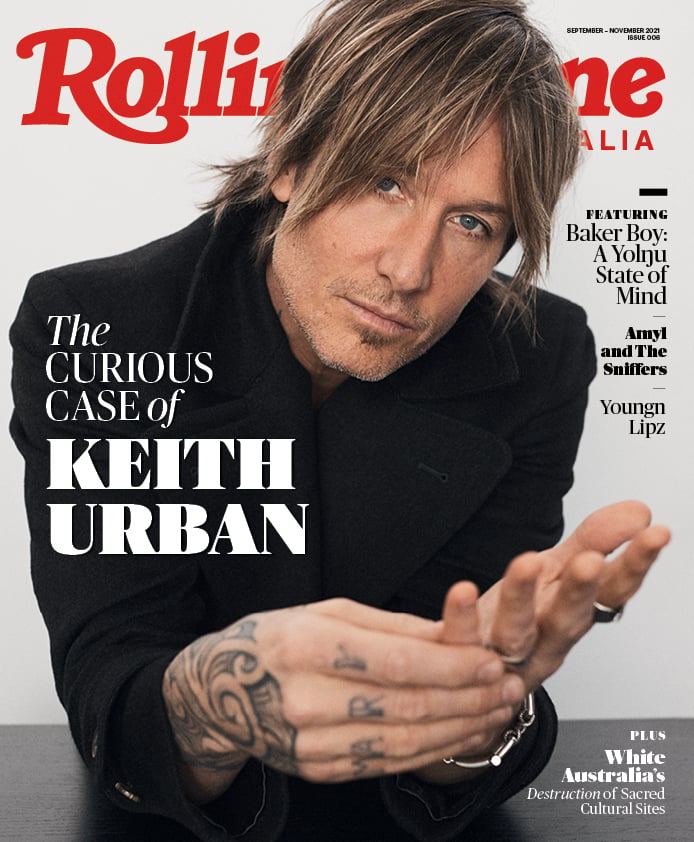
The latest issue of Rolling Stone Australia, featuring Keith Urban on the cover. (Cover photo by Tim Ashton (@timjohntom), taken in Sydney on July 23 2021 for Rolling Stone Australia)
As I sit down to interview Keith Urban, it seems to me like he’s anywhere but trapped in a windowless room—or any other form of metaphorical limitation. He’s everywhere right now. He’s on your TV as a judge on The Voice Australia, in your playlists with his collaborations on Taylor Swift’s Fearless (Taylor’s Version), on billboards for his national tour, and all over the radio with singles like “Out The Cage” and “One Too Many” from his ARIA number one album THE SPEED OF NOW Part 1.
When he enters the room at his label’s headquarters in Sydney, he’s looking relaxed, well-slept, and comfortable. He’s sporting a Sleaford Mods T-shirt, new tattoo ink on his right hand, and a dusting of highlighter makeup in the corners of his eyes—clear blue and alert. Urban suits being back in Australia.
He’s been here in Australia for most of the COVID-19 pandemic. He and his family of four split their time between here and America. Thanks to low case numbers last year, Australia became a popular new hub for the film and music industries.
Love Music?
Get your daily dose of everything happening in Australian/New Zealand music and globally.
With four Grammy wins, 18 more nominations, five ARIA Awards, and 24 country number one hits, Urban has solidified his position as a music industry powerhouse. It hasn’t always been this way though; his journey to success has been littered with roadblocks and hurdles. Candidly, Urban tells me about the time he was recording his third album Golden Road (2002) and was cut down by a record label executive.
“I remember it so vividly,” says Urban, squaring his shoulders and leaning back. “He sat there listening to [the songs] and he goes, ‘No, I don’t hear anything’. And I said, ‘What do you mean, don’t hear anything? You mean maybe you don’t hear something for radio?’ He goes, ‘No, I just don’t hear anything that you should put on your record’. And I was like, ‘Well, these are all for the record’.”
The songs in question were a stark change in style from Urban’s previous work. Self-produced, they were raw, and transcended the traditional frontiers of country music, hinting at Urban’s music genre-fluidity to come. Urban says he was “gutted” when he called the record’s engineer Justin Niebank, and relayed the label exec’s review.
“[Niebank said] ‘You went into that meeting with your artist hat on, you should have had your producer hat on’. And I said, ‘What would have been the difference?’ He said, ‘You would realise that the guy’s a complete idiot and you would have walked out of there going: These songs are fine, that guy’s a wanker and we’re just going to go and make the rest of the record. And that’s when you would call the artist and you would give them the good news’.”
Urban is smiling now. It’s clear he looks back on that phone call fondly. “I was like, ‘Well that sounds really good. That sounds very empowering, I’m going to do that’.”
Of the six tracks Urban played for that label president, one track—”Who Wouldn’t Wanna Be Me”—hit number one on the US country chart. Released in 2003, two years before Urban met his wife Nicole Kidman at a G’day USA Gala in Los Angeles, the ode to a penniless love story speaks to the warmth of the man singing it. Of the other 12 tracks on Golden Road, two more took the top spot, another charted at number three, and the album went triple Platinum in the US.
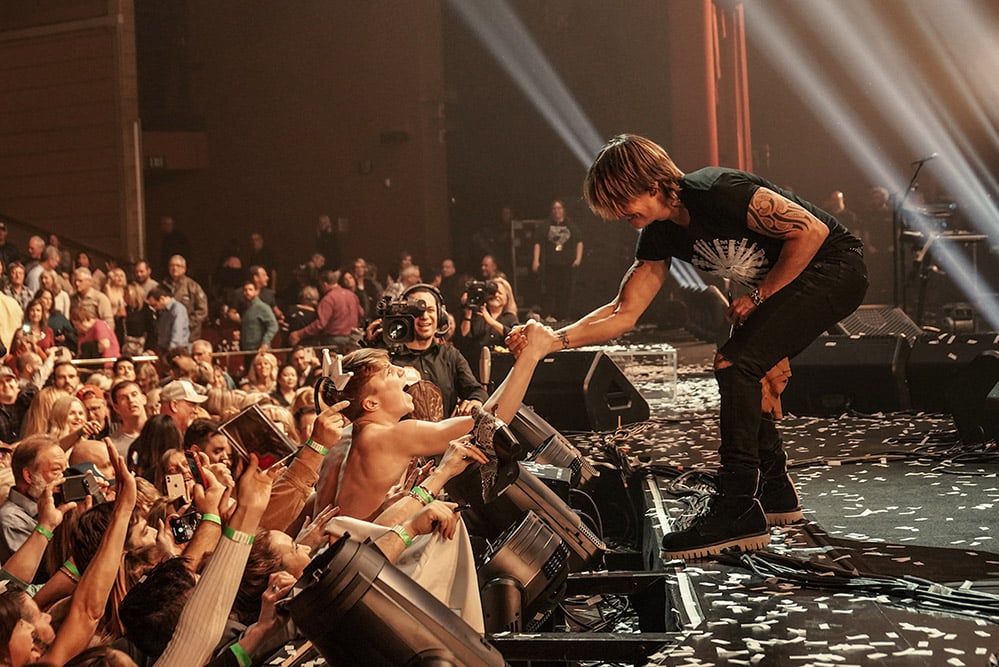
Keith Urban during his Las Vegas residency at Caesars Palace (January, 2020). (Photo: Supplied by EMI)
Keith Urban has been undergoing a public metamorphosis over the last two decades. Most striking was the release of his eighth album Fuse, the lively big beat twist on country pop that came out in 2013. With 31 years of country music accolades under his belt, you might have thought Urban was country to the core. But anyone who’s been paying attention over the last two decades can see his music falls far outside the traditional country canon.
He’s been writing songs with a drum machine and a six-string banjo for over two decades, and his producer picks consist of those he believes can challenge the traditional boundaries of the country genre. Butch Walker’s punk and metal grit can be heard on 2013’s “Even The Stars Fall For You”. Meanwhile, Stevie J’s schmaltzy R&B leanings form the soundbed of “You’re The Only One” from Urban’s eponymous second album, released in 1999.
The latter is punctuated with programmed drums, an uncommon feature in songs from Urban’s contemporaries in his adopted home of Nashville at the time. As a musician, Urban serves the song, not the genre. Urban tells me he feels limitless when he’s writing in a studio, surrounded by all his instruments. “I like the creativity of being in the studio,” he says. “[…] I can direct the change in scenes on the set all in real time, so that you can go with the flow.”
When Urban began developing his boundless approach to music, he was also chipping away at the enduring image of his early career: the Aussie-raised country star ready to be anointed the next Slim Dusty. Now, with tracks like “The Fighter” with Carrie Underwood and “One Too Many” with P!nk, listeners have come to expect his music will straddle multiple genres.
In a way, it was his surroundings that tied Keith Urban so tightly to the country music label. “I’ve just now been able to express more broadly what I felt inside,” he admits. “Even my ability to express myself was a bit limited for a lot of years, just for… all manner of reasons really.”
“Even my ability to express myself [musically] was a bit limited for a lot of years.”
One of those reasons was the environment he thrust himself into when he made the big move from Brisbane to Nashville in 1992. So-called Hat Acts reigned supreme and Urban was left circling the fringes for a long time, slogging it out as a songwriter in windowless rooms for five years—except this time it wasn’t his imagination keeping him there.
Nashville has a saying: “Y’all come back now, ya hear”. According to locals, this actually translates to, “Get out”. So when Urban arrived, bringing the love of Americana he inherited from his father, and his obsession with Iron Maiden, Judas Priest, and Fatboy Slim, his musical ethos didn’t necessarily fit with the musical capital of the south.
“You don’t really get help and support until they see that you’re really becoming a part of the community. It’s very hard,” Urban admits. He sounds neither wounded nor indifferent; it’s clear he respects Nashville’s traditions.
Following his Nashville songwriting years, Urban began recording his own music, first with The Ranch, then on his own. His albums began to include sections which sounded more fluid stylistically, dipping his feet into other things and experimenting with different genres. “Slowly over a lot of records, I was getting to the point where I went, ‘Well why don’t we earmark the singles for country radio and then the others I can just play with and expand those out? They aren’t for radio’.”
“I was getting to the point where I went, ‘Well why don’t we earmark the singles for country radio and then the others I can just play with…”
This approach filled the belly of two beasts: the listeners of country radio and Keith Urban’s curiosity. It worked too. His records feel capacious in the way they make room for myriad genres and sounds. His music feels universal and his growing fanbase is proof.
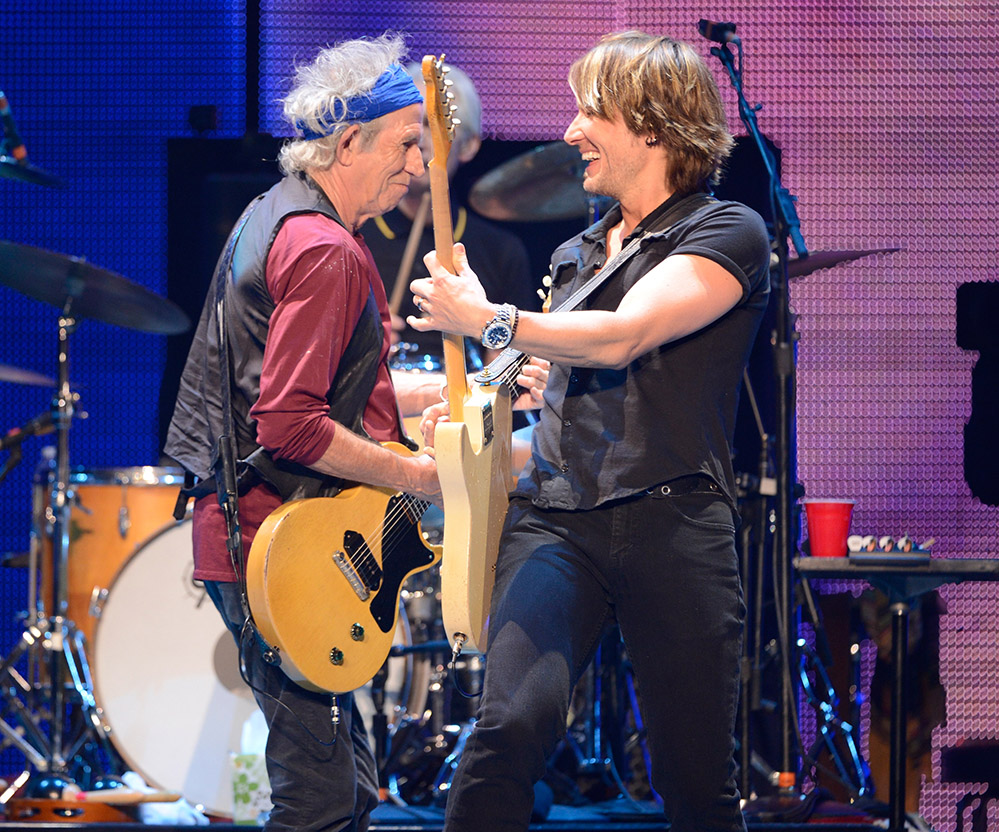
Keith Urban and Keith Richards perform on stage during the Rolling Stones “50 & Counting” tour opener at Staples Center on May 3, 2013 in Los Angeles, California. (Photo: Kevin Mazur/WireImage; Supplied By EMI)
A few weeks later, Urban and I meet at Qudos Bank Arena, the venue he’s booked to play twice this December. It’s an overcast morning and the winter clouds are so low and heavy it feels like you could punch them back into the sky. Urban is chewing gum and he’s dressed in the same Sleaford Mods T-shirt he was wearing last time; this time with an army green puffer jacket, jeans, and black and white Nikes with a graffiti-design all over them.
Since we last spoke, he’s been to Nashville to host the ACM Awards. Upon return, and following weeks of quarantine, he shot a video for Hans Zimmer’s version of John Lennon’s classic “Imagine” for the Tokyo Olympics.
Having been largely based in Australia since COVID-19 hit, Urban has had the luxury of spending more time with his mum and older brother Shane. He explains how, over the Easter long weekend, the three of them were discussing his late father’s struggle with alcoholism and how his style of discipline was often quite… heavy-handed.
“My brother and I are very much in sync with our memories of everything. But it’s not necessarily shared by my mother,” Urban says, shifting in his seat. “Slightly different memory, different way of framing everything; selective memory. But maybe even at some point where that sort of deniability becomes a real thing and it’s real. You know, whatever it takes to survive and get through things can actually become quite factual in memory. [Mum would say], ‘Oh your dad would never have done that’. And just like, oh my God, really? Are you really saying that? Okay, okay. Let’s just move on, let’s move off that.”
Urban’s father Robert, who passed away four years ago after a battle with prostate cancer, played a mighty role in his pursuit of music as a career. A drummer who owned a convenience store in Caboolture when Urban’s family moved from Whangarei, New Zealand, he never played professionally—but he did perform with Kiwi band The Ricochets in the late Fifties for a time. Robert’s love of American culture meant Johnny Cash and his At Folsom Prison record was a household staple and trips to Tamworth Country Music Festival (where Urban won the CCMA Talent Quest on his first visit at age nine) were annual affairs. Robert was intelligent, but also unpredictable.
“[I would ask myself] is my dad sort of being a good disciplinarian or is this a bit excessive? Or I don’t know. What’s normal?” he trails off, thinking. “[…] It’s sort of like you don’t know where you fit in the scheme of it all.”
Urban says he himself got lucky. Fifteen years sober, he has clarity about his past drug and alcohol abuse. Some of it shows up on record—on “Say Something” he sings, “I don’t want to be like my father was / Afraid of words and opening up”—but mostly it’s given him freedom. No more secrets, no more lies. “It’s much easier to look people in the eye and talk,” he says pointedly.
“It took me a long time to get sober,” he says. “Took me a long time to recognise my alcoholism. A long time because I didn’t drink like my dad, so I compared everything to him. So it just took a long time for me. But I was able to finally make the right choice in my life, that I wish my dad would have made.”
“I was able to finally make the right choice in my life, that I wish my dad would have made.”
That choice was presented to him when his wife Nicole Kidman staged an intervention just before his 40th birthday in 2006, four months after their wedding. When I ask about that particular moment, the one that led to him checking into the Betty Ford Clinic, he gives me a look. It’s kind, unprickly, but direct: “That’s very personal,” he says.
Before the intervention, Urban had been toeing the line between a strait-laced workaholic (he never played or recorded under the influence), and an alcoholic and drug addict. When he was working hard, his career would flourish, the opportunities coming in thick and fast. But when the horse would bolt out of the stable, his music would take a backseat for days on end, until he could rein it back in again.
“It’s not an uncommon story,” he muses with a thousand-yard stare. “You know, the career’s on fire and the personal life is also on fire, completely in the wrong way. That was the case for me. I was a real binge drinker.”
Urban says that when he moved in with a guy who freebased cocaine in Nashville, that line between working and being unable to started to blur. “I’d never been around anything like that in Australia. Only pot smokers, you know, not much more. And suddenly I’m with a guy who is freebasing coke. That was a whole other world that I fell into really fast.”
Urban’s been “working the programme” for 15 years now. And as you would expect from a man who almost lost everything, he can now quote full paragraphs of the “Big Book” (the Alcoholics Anonymous bible).
“I love that the book starts out by saying, ‘We realise we know only a little’,” he pauses, eyes wide. “Wow, what an amazing statement, the opposite of so many other structures.”
One of the objectives of the Alcoholics Anonymous programme is to rid oneself of ego and the fear that it can provoke. It would come as a shock for anyone who knows Urban now to think that he would have had to try and rid himself of ego—“egotistical” is the last word people who know Urban would use to describe him.
“I’ve got a really great sponsor I’ve had for years and years, and early on we were sitting down talking and he says: ‘Keith, you know how much people think of you?’. And I said, ‘How much?’ and he goes, ‘Rarely’.” Urban chuckles. “I carry that with me all the time and I love it so much.”
Keith Urban enjoys his world of sobriety just as much as he enjoys singing about his years without it (“One Too Many”, “Wasted Time”). “It’d be a really limited palette if I only sang about my life right now. I don’t think Dolly Parton worked 9-5,” he laughs. “Also, it can be metaphoric too. You know, it doesn’t have to be taken literally.” Urban has no qualms with anyone else who chooses to drink or use drugs. He’s also happy to be around alcohol too—he keeps it in the house in case his guests want it—but he likes to refer to himself as “allergic”.
“The reason I don’t really talk much about sobriety is it’s a very personal thing and I don’t want anyone thinking that I have a negative opinion of drugs or alcohol,” he says. “I don’t have any at all, none. I want people to come to my concert and do whatever the hell they want to do.
“[…] I don’t want people at my concert looking at the stage and thinking about sobriety,” he continues. “That would be the death of a gig for me. It’s not what I want. I’m not there for that. I’m not an AA meeting. I’m on stage and I’m playing and I’m singing, and we’re going to have a great time. We’re going to let go of everything and be in the moment.”
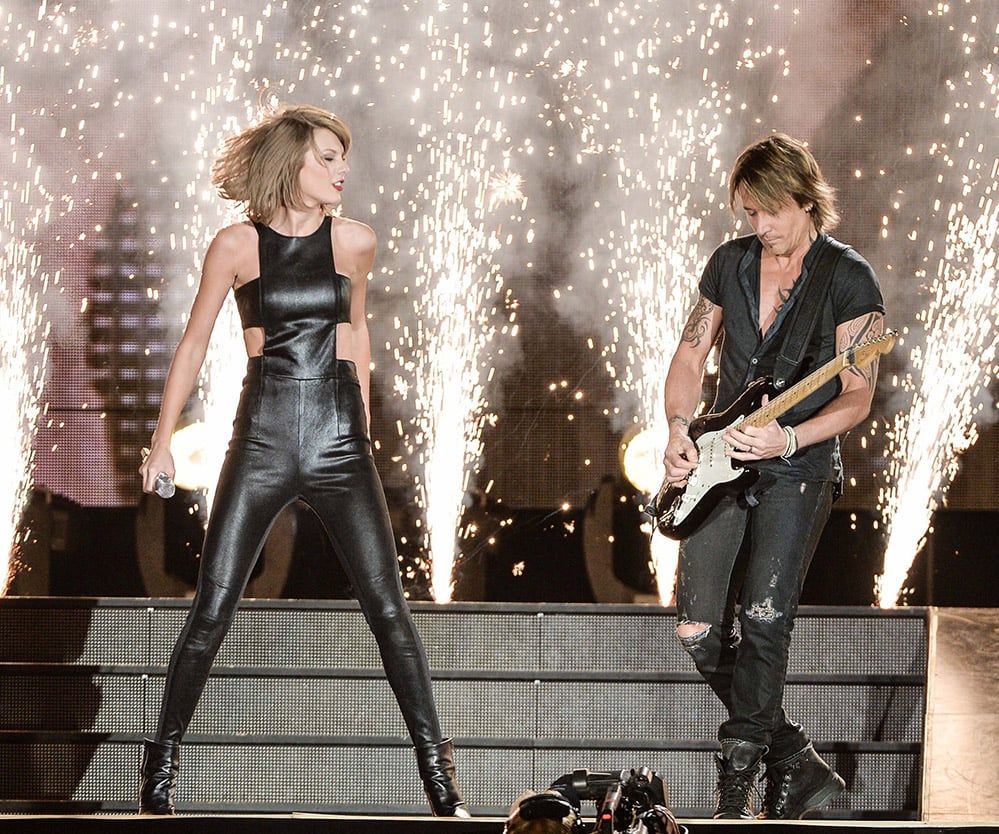
Keith Urban joined Taylor Swift at her Toronto concert at Rogers Centre, October 2nd, 2015. (Photo: Supplied by EMI)
You get the feeling Keith Urban seeks connection in all his interactions, both on and off stage. During our time together, he often directs significant questions toward me, turning the interview into more of a conversation, perhaps reflecting the natural curiosity he has about other people and their lives. In the studio, this curiosity manifests itself as a deep passion for collaboration.
Recently, his 13-year friendship with Taylor Swift resulted in a collaboration on two tracks for her re-recorded Fearless (Taylor’s Version) album. While Urban was Christmas shopping at Bondi Junction Westfield Mall last year, Swift sent across an audio file for him to listen to. By February, Urban was holed up at Sydney’s Forbes Street Studios laying down backing vocals and guitar tracks for “That’s When” and “We Were Happy”.
“There’s a palpable purity to what Keith does and there always has been,” Taylor Swift tells me over email. “You see him on stage and you truly believe that guy is lost in the song, escaping into the moment. I think his experimentation is a direct manifestation of that love.
“There’s a palpable purity to what Keith does and there always has been.”
— Taylor Swift
“His melodies and inflections influenced me so intensely because they were so different from what I was hearing in country at that time, incorporating rock, pop, and blues into the mix,” she adds. “He absolutely redefined the genre for me, by making it a wider and more expansive place to create from within.”
When Keith Urban talks about one of his more recent collaborators—the Atlanta-based Breland—you can hear echoes of what it must be like to be in the studio with him. Urban tells me about how he read an interview with Breland online, one where he discussed liberated creativity when it comes to genre. As he relays it, he’s inching forward in his seat and his hands are flying in all directions. He explains how a simple text on a Friday in May 2020 (“Hey it’s Keith (Urban). Can I call you?”) led to a 45-minute phone call, then a four-hour drive the next Wednesday from Atlanta to Nashville, then a 9am call from Breland saying, “Hey, I’m in your driveway”.
“I just went, ‘I love this kid’,” he grins, shaking his head with delight. “Like, that’s the attitude you’ve got to have. Like, let’s make it happen. None of this ‘Yeah, let’s do lunch someday’, you know.”
The pair wrote multiple songs that day, one of which is the frenetic lightning-bolt “Out The Cage”. Taking energetic cues from electronic perfectionists like The Prodigy and the brutal power of simple melodies, Breland and Urban wrote a song about breaking out of a prison of your own making.
“It was halfway through writing the song when I said, ‘Nile Rodgers would love this track’. And he goes, ‘Oh well yeah, but I mean how are we going to get it to Nile?’ And I go…” Urban pretends to pick up a phone, “’Hey Nile, it’s Keith, man we’ve got this song. Can we send it to you?’”
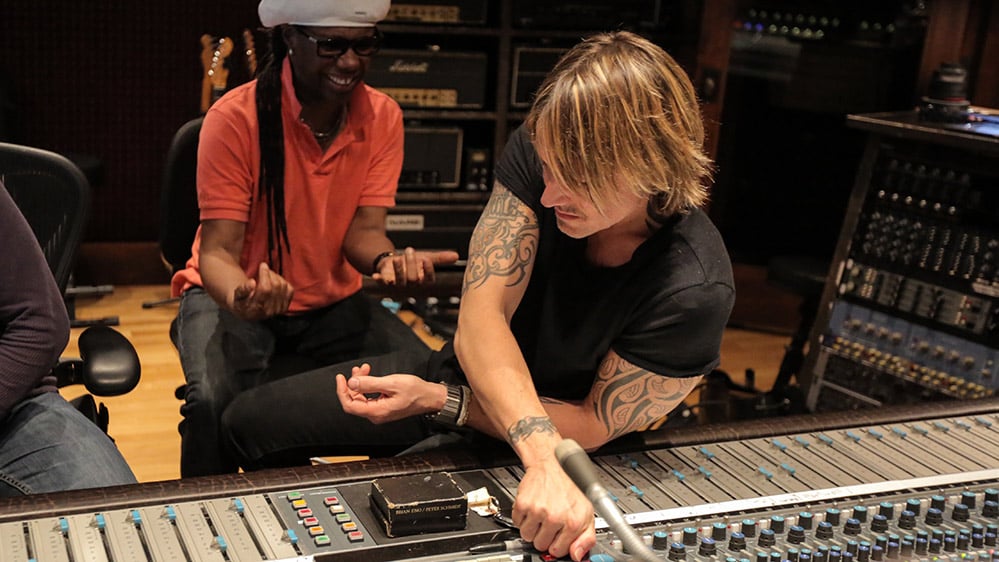
Keith Urban and Nile Rodgers, 2016. “Keith and I could just sit in a studio and just play, all day long.” (Photo: Supplied by EMI)
The legendary funk master loved the song and sent across the rapid-fire guitar parts which give it an intuitive promise of rhythm hypnosis.
Speaking over Zoom from the library floor at his studio in Westport Connecticut, Nile Rodgers plays me an audio recording from their back-and-forth conversations that day. “Let me see if I can pull this up,” he says, scrolling through his phone messages.
Keith Urban’s excited voice blasts through the speaker: “Nile, hey. We’re just working out some of the banjo and your guitar.” A single strum is heard as Urban readies himself on the other end. “Check this out, it’s so cool.” The opening riff plays, building to the point of chaos in the same way it does when you stream it now. “Woo!” he hollers, “sounds so good man!”
Nile Rodgers first met Keith Urban at a pre-Grammys party at Jimmy Iovine’s house in 2015. A jam session led to exchanged numbers, which later led to a few hours in the studio together—something the pair still do now, just for fun.
Rodgers says Keith Urban is fearless. He recalls his FOLD Festival show with Chic in 2015. It was a sell-out event, and Rodgers’ band became Urban’s for the night. Just as the performance was heating up and Rodgers and Chic were feeding off Urban’s energy, but also following sheet music, Urban went off-script. He launched into an impromptu jam session that became a 13-minute guitar battle with Nile Rodgers.
“He just looks at me and he’s like, ‘Okay bro, it’s time to jam now’. It became like Woodstock or something.” Rodgers gives a full laugh. “Then we started battling each other. […] It was so much fun.”
Urban often speaks in metaphors. Perhaps it’s a by-product of being a songwriter, but it feels more genuine and instinctive than that. When I remind him of that guitar battle with Nile Rodgers he says: “The conversation is when improvisation starts. That’s when you’re having a chat with each other through your instruments.”
Fascinatingly, Urban has only just started calling himself a songwriter. He’s not the type to play every day and he tells me it’s been a week since he last picked up a guitar.
“For the longest time I would say to myself, I’m not really a songwriter. I’m a guitar player blah blah blah,” he says. “[…] In the last year or two I’ve pivoted to saying, ‘Well I love writing songs’,” he pretends to give himself a good talking to, “just start there Keith.”
“For the longest time I would say to myself, I’m not really a songwriter.”
As a faultless guitarist, Keith Urban has the skill to guide you on a musical journey through what can sometimes be confronting lyrical terrain. Onstage, there are so many different elements to his performance that you can’t possibly take them all in. At first, Urban was obliged to be a multi-instrumentalist for economic reasons; he was a solo artist wanting to create a big band sound, so he needed to be able to do everything himself. Now, that training means he’s a master in the studio and onstage. Impressively, Urban plays guitar riffs and sings verses at the same time, not just the chorus—and it’s caught the envious eye of the world’s best virtuosos.
John Mayer is arguably one of the most qualified wood-shredders to speak to Urban’s guitar-playing chops. Having performed live together multiple times, including a momentous performance at CMT Crossroads in 2010, the pair’s friendship makes perfect sense.
“It’s hard to make people who don’t play guitar care about guitar solos,” says Mayer, “but Keith is one of those rare few who knows how to make the guitar speak inside of their songs. His phrasing is really special. Part of appearing effortless is that people don’t notice the effort, but he’s doing some really beautiful and fluid stuff that’s way harder to pull off than you might think.”
“Keith is one of those rare few who knows how to make the guitar speak inside of their songs.” — John Mayer
In an unexpected moment, Mayer details the time he sold Urban a highly collectible, highly expensive amplifier and Urban brought him the cheque for it inside a large, silver metal suitcase—like the ones “you see handcuffed to people in the movies”.
“I thought it was a great way of leaning into the insanity of it all,” says Mayer. “I still have the case. It’s a great keepsake.”
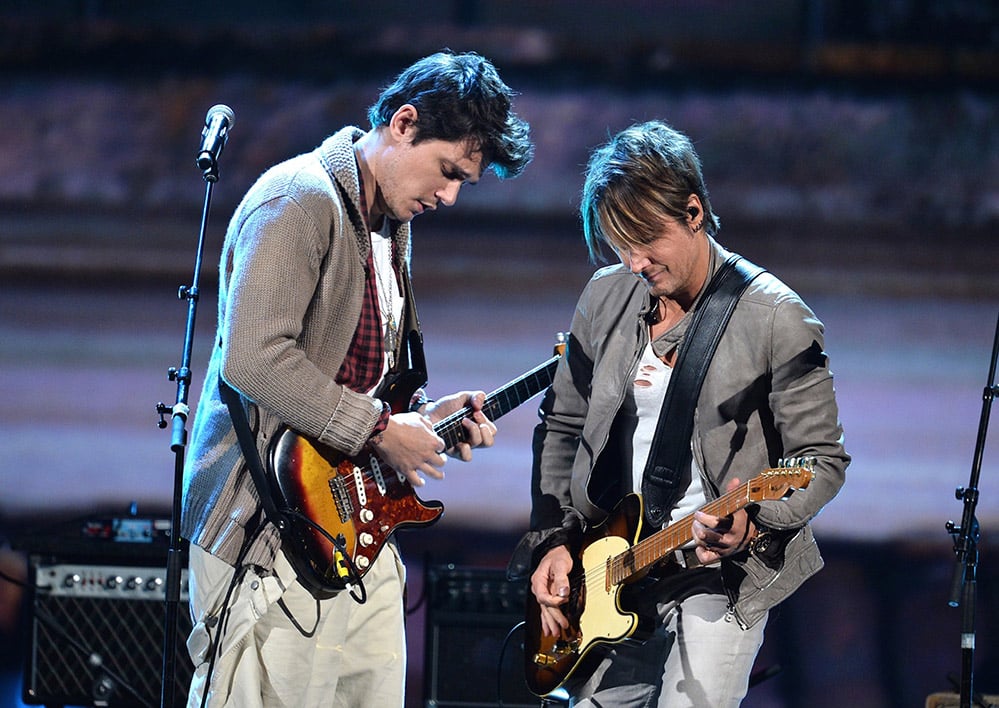
Keith Urban performing with John Mayer in February 2019 for the Grammy’s Beatles Tribute show. (Photo: Kevin Winter/Getty Images for NARAS; Supplied by EMI)
Time seems to slow down when you’re around Keith Urban. He has an impressive ability to stay in the moment. He has a saying: “No whining on the yacht”, and walking the length of the arena he’ll fill in December, it’s clear he doesn’t take all this for granted.
I point to the “cheap seats” way up at the top of the arena and ask if he has any tricks for reaching them when he plays live. “I know what it feels like to be up there,” he says. “Everybody’s got a story about what it took to get to the gig.”
Urban grew up playing in pubs and clubs, four hours a night, five nights a week. He became accustomed to the punter who stood close to the stage with his arms folded. He uses that image even now.
“It’s very much in my DNA to be ready for this,” Urban crosses his arms and furrows his brow. “Sort of sussing you out, going, ‘Alright let’s see what you do’. […] In my head that’s what I come out playing to.”
Keith Urban doesn’t have the ability to phone in a gig. Right now, it’s been a year-and-a-half since he last played a live show. His last gig was in Las Vegas for his residency before the pandemic put it on hold. He gave it everything he had. No regrets, no self-reproach. His next show will be at a festival in Ohio in August, followed by the resuming of his Las Vegas residency for five shows.
Keith comes across as a joyous man, not because he’s oblivious to the world around him, sheltered by a career of success and celebrity, but because he actively engages with everyone and every emotion. Right now, he’s reading Stan Grant’s book With the Falling of the Dusk, about global challenges from the perspective of a Wiradjuri man. And he’s just finished Jill LePore’s These Truths, on the formation of America. His interest in global issues has recently been amplified by the current pandemic. On a personal level, he feels for the music industry which has given him so much, but he’s also concerned about the wider impact of the virus on every part of society.
Urban’s public contributions to COVID-relief initiatives include playing a free Drive-In show for health care workers in Nashville, the ‘One World: Together At Home’ broadcast, and the donation of several of his guitars to keep students engaged with music when they couldn’t attend school, including via Mr Holland’s Opus Foundation and the WO Smith School of Music, among others.
When Keith Urban talks, every part of him talks: his hands, his body, his eyes most of all. He’s telling me about the new songs he’s finished and you can tell he’s excited. One song, “Crimson Blue” was co-written with Breland, Sam Sumser, and Sean Small—they’re quite new to writing together and he tells me they’ve named themselves Metaphor. “Crimson Blue”, a dream-state chamber-pop arrangement, is set to feature in the final episode of Nicole Kidman’s new TV miniseries, a filmed adaptation of the novel Nine Perfect Strangers. Another track, the soulful “Perfect” with Breland on lead vocals, was originally written for Nine Perfect Strangers but is likely to be released by Breland as a single. Urban plays both tracks through a bluetooth speaker and you can hear the magic that happens in a session when he’s with artistic equals.
Urban then offers an introduction of sorts to his new single, “Wild Hearts”. He explains how it was sent to him by co-writers Brad Tursi, Eric Pasley, and Jennifer Wayne, and he loved the chorus, but asked if he could write his own verses. The song, an anthemic rallying cry for the uninvited, made him think about the detractors in his early years. In the early Nineties, Urban had just returned to Australia after one of his first trips to Nashville and an artist made a snide comment that has always stuck with him.
“He said, ‘Oh yeah yeah yeah, gotta get that out of your system don’t you?’,” Urban shakes his head. Little did he know, Urban would go on to become one of the biggest names in music and Australia’s highest-earning country-crossover export.
“I almost think I’ve gotten more from the people who didn’t believe in me,” he grins.
“I almost think I’ve gotten more from the people who didn’t believe in me.”
The bluetooth speaker fills the arena with Urban’s new single “Wild Hearts”, six weeks before its official release, and five months before his national tour is set to fill this very room, twice over. The lyrics punch the air and I visualise 20,000 fans singing along with him:
“This goes out to the wild cards and all of the wild hearts.
Just like mine.”
Keith Urban’s ‘The Speed of Now’ World Tour – Australian Dates 2021
Wednesday, December 1st, 2021
Newcastle Entertainment Centre, Newcastle, NSW
Friday, December 3rd, 2021
Qudos Bank Arena, Sydney, NSW
Saturday, December 4th, 2021
Qudos Bank Arena, Sydney, NSW
Monday, December 6th, 2021
WIN Entertainment Centre, Wollongong, NSW
Wednesday, December 8th, 2021
Adelaide Entertainment Centre, Adelaide, SA
Friday, December 10th, 2021
Rod Laver Arena, Melbourne, VIC
Saturday, December 11th, 2021
Rod Laver Arena, Melbourne, VIC
Tuesday, December 14th, 2021
RAC Arena, Perth, WA
Friday, December 17th, 2021
Brisbane Entertainment Centre, Brisbane, QLD
Saturday, December 18th, 2021
Brisbane Entertainment Centre, Brisbane, QLD
Sunday, December 19th, 2021
Gold Coast Convention and Exhibition Centre, Gold Coast, QLD



































